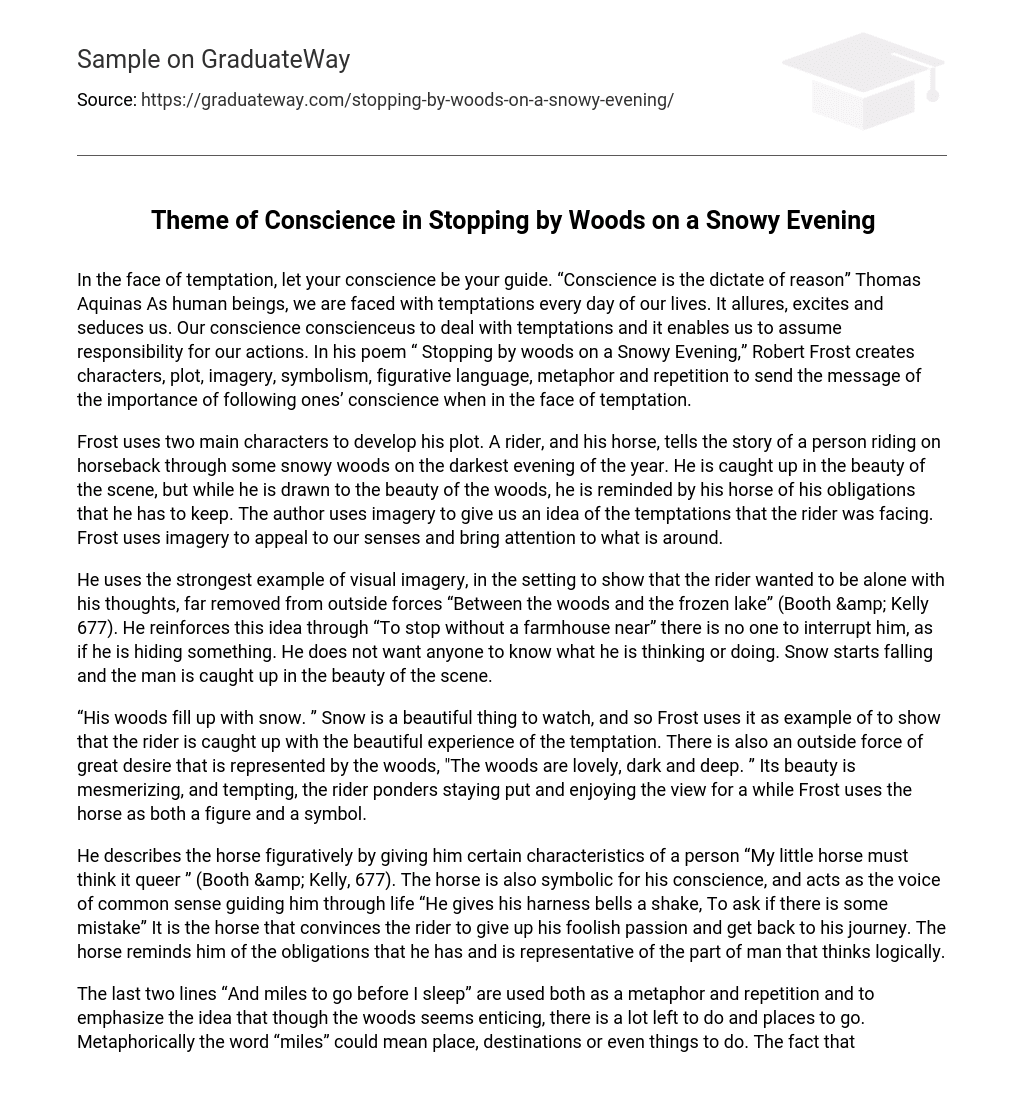In the face of temptation, let your conscience be your guide. “Conscience is the dictate of reason” Thomas Aquinas As human beings, we are faced with temptations every day of our lives. It allures, excites and seduces us. Our conscience conscienceus to deal with temptations and it enables us to assume responsibility for our actions. In his poem “ Stopping by woods on a Snowy Evening,” Robert Frost creates characters, plot, imagery, symbolism, figurative language, metaphor and repetition to send the message of the importance of following ones’ conscience when in the face of temptation.
Frost uses two main characters to develop his plot. A rider, and his horse, tells the story of a person riding on horseback through some snowy woods on the darkest evening of the year. He is caught up in the beauty of the scene, but while he is drawn to the beauty of the woods, he is reminded by his horse of his obligations that he has to keep. The author uses imagery to give us an idea of the temptations that the rider was facing. Frost uses imagery to appeal to our senses and bring attention to what is around.
He uses the strongest example of visual imagery, in the setting to show that the rider wanted to be alone with his thoughts, far removed from outside forces “Between the woods and the frozen lake” (Booth & Kelly 677). He reinforces this idea through “To stop without a farmhouse near” there is no one to interrupt him, as if he is hiding something. He does not want anyone to know what he is thinking or doing. Snow starts falling and the man is caught up in the beauty of the scene.
“His woods fill up with snow. ” Snow is a beautiful thing to watch, and so Frost uses it as example of to show that the rider is caught up with the beautiful experience of the temptation. There is also an outside force of great desire that is represented by the woods, “The woods are lovely, dark and deep. ” Its beauty is mesmerizing, and tempting, the rider ponders staying put and enjoying the view for a while Frost uses the horse as both a figure and a symbol.
He describes the horse figuratively by giving him certain characteristics of a person “My little horse must think it queer ” (Booth & Kelly, 677). The horse is also symbolic for his conscience, and acts as the voice of common sense guiding him through life “He gives his harness bells a shake, To ask if there is some mistake” It is the horse that convinces the rider to give up his foolish passion and get back to his journey. The horse reminds him of the obligations that he has and is representative of the part of man that thinks logically.
The last two lines “And miles to go before I sleep” are used both as a metaphor and repetition and to emphasize the idea that though the woods seems enticing, there is a lot left to do and places to go. Metaphorically the word “miles” could mean place, destinations or even things to do. The fact that the line is repeated makes you notice its importance, and that he is stressing the point that ultimately he must give up this beauty for reality. His conscience made him realized that whatever he is experiencing is only temporary.
His obligations are what is important to him and cannot be set aside for personal gratification, and so he repeats this mantra to himself. In conclusion, Robert Frost, through his poem “Stopping by Woods on a Snowy Evening,” presents one person’s momentary encounter with temptation. He paints a vivid picture though his characters, plot, imagery, symbolism, figurative language, metaphor and repetition, of what a person goes through when faced with a moral decision. In the end, the only true guide is our conscience; it is the voice of reasoning. Works Cited
Booth, Allison, and Kelly J. Mays. The Norton Introduction to Literature. New York: W. W Norton & Company, 2011. Print. Literary Analysis of Robert Frost’s Stopping by the Wood on Snowy Evening. Retrieved on 10/09/2012 from www. scribd. com. Poetry analysis: Stopping by Woods on a Snowy Evening, by Robert Frost. Retrieved on 10/09/2012 from www. helium. com. Stopping by Woods on a Snowy Evening. Retrieved on 10/09/2012 from www. wikipedia. org. Stopping by Woods on a Snowy Evening by Robert Frost. Retrieved on 10/09/2012 from www. poetryfoundation. org.





